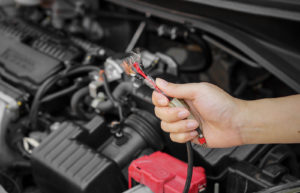How to Stop Rodents from Chewing Car Wires
June 19th, 2020 by Fix Auto USA

Rodents chewing car wires can cause costly, time-intensive vehicle problems, including fuel sensor and headlight malfunctions. To understand the impact of rodents chewing car wiring, let’s look at some of the key questions associated with this issue.
Why Do Rodents Chew Car Wires?
Rodents may be drawn to car wire insulation made of soy, peanut oil, rice husks, and various plant-based materials. The insulation can produce a faint vanilla aroma when it is warm, which may make car wires appealing and appetizing for rodents to chew. In addition, a rodent may chew on car wires near a nest it builds inside of a car.
Rodent-based car wire damage can affect drivers of all makes and models, and it can be significant. Your insurance may cover chewed car wires if you have comprehensive coverage in place. Yet, regardless of your insurance policy, you need to plan ahead for the risk of rodents chewing car wires.
Is It Common for Rodents to Chew Car Wires?
Rats, mice, and other rodents are driven to find a place to survive. Meanwhile, a car’s engine bay provides a dark, warm, and secluded space for rodents to store food and build a nest. This may lead a rodent to enter your car’s engine bay and use it as a home.
Rodents may also discover wires across your car’s engine bay satisfy their desire to chew and gnaw on things. The wires can provide an unexpected food source to rodents, too. As a result, rodents are prone to enter a car, chew on wires, and use the vehicle as part of their ongoing efforts to stay alive.
Is It Possible to Prevent Rodents from Chewing Car Wires?
For those who want to know how to keep rodents from eating car wires, here are tips to help you do just that:
1. Set a Trap
Place mouse and rat traps around your car. You can also set up traps on top of your car’s wheels, as some rodents will climb the wheels to access the engine bay.
2. Use a Smell or Taste Deterrent
Peppermint oil and Pine-Sol provide strong scents that deter rodents from entering your car, won’t make your vehicle smell bad, don’t taste good, and won’t damage any wires. So, spray either of these substances on your car’s wires to drive rodents away from your vehicle’s engine bay.
3. Park Your Car in a Sealed Garage
Park your car indoors whenever possible. If you keep your vehicle in a garage but find that rodents still chew your vehicle’s wires, assess your garage for any cracks or holes, then seal them.
4. Remove Food from Your Car
Eliminate any fast-food scraps, candy wrappers, or other food remnants that otherwise can make your car attractive to rodents. Perform regular interior car cleaning, and you can further reduce the risk of rodents entering your vehicle.
Also, if you park your car in your garage, store your dog or cat food bins or garbage cans elsewhere. This allows you to keep various food sources for rodents away from your car.
5. Run Your Car Regularly
Start your car regularly, even if you don’t drive it often. Rodents frequently search for dark, sheltered environments where they can settle down. By starting your vehicle, rodents may start to notice that your car’s engine bay is a loud, dangerous spot to enter.
6. Keep Leaves Away from Your Car
Rake leaves away from your car. Rodents may use foliage as shelter from the rain. However, if your vehicle is parked near leaves, rodents may see the leaves as a possible shelter, and ultimately, enter your car. To avoid this problem, remove leaves near your car and eliminate the chances.
7. Leave Your Car’s Hood Up at Night
Keep your car’s hood up if your vehicle is parked in a garage at night. This eliminates the temptation for rodents to use your car’s engine bay as a nesting ground, as the environment is no longer dark, warm, or comfortable.
How Can You Tell If Rodents Have Chewed Car Wires?
If your car’s engine wires appear to have been gnawed or chew holes are visible in different nonmetal engine components, rodents have likely entered the engine bay. There is a chance that rodents have damaged other areas of your car as well.
Rodents can enter your car through several areas, including air vents, cable holes, and the steering column. Once they enter your vehicle, they can cause serious damage in a short amount of time.
Chewed car wires can cause your vehicle’s check-engine light to turn on. They may also prevent you from starting your car. Thus, chewed car wires must be addressed immediately.
What Should You Do If Rodents Chew Car Wires?
It may seem beneficial to try to fix chewed car wires on your own, but doing so may cause additional damage to your vehicle. If you encounter chewed car wires, visit an auto repair shop.
An auto repair shop employs friendly, knowledgeable professionals who can assess chewed car wires and repair or replace them. Plus, these professionals can provide recommendations to help stop rodents from chewing your car wires again.
Get chewed car wires inspected and fixed by auto repair shop professionals, and you can keep your vehicle running at top levels.
This blog post was contributed by Fix Auto Sunnyvale a leading industry expert and collision repair shop servicing the western Santa Clara County.
Welcome to
Fix Auto USA
We are the premier independent body shop network delivering world-class customer service and high-quality collision repairs across the U.S.
Learn About Us





